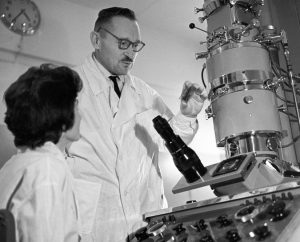Menu

Viktor Zhdanov, 1958
Viktor Mikhailovich Zhdanov was born in the village of Shtepino (Ukraine). Zhdanov (13 February 1914 – 1987) was a virologist and instrumental in the effort to eradicate smallpox globally.
After graduating from Kharkiv Medical Institute in 1936, he spent the next decade working as an army doctor, where he became interested in epidemiology; this work would directly lead to his doctoral thesis on Hepatitis A.
In 1946, Zhdanov was invited to become Chief of the Epidemiology Department of the I. I. Mechnikoff Institute of Epidemiology and Microbiology in Kharkiv, becoming its director two years later. His work in virus classification saw him admitted to the International Committee on Taxonomy of Viruses as a life member.
Alice Bukrinskaya, the D.I. Ivanovsky Institute of Virology, Moscow, U.S.S.R, [3] would say this about him after he died:
Zhdanov was a scientist of keen and inquisitive mind and extraordinary flexibility of thought, a declared enemy of dogmatism and bureaucracy. He was an amiable, warm and charming person, highly appreciative of the other's talent, a reliable, humorous and attentive friend.
In 1958, Zhdanov, as Deputy Minister of Health for the Soviet Union, called on the World Health Assembly to undertake a global initiative to eradicate smallpox. The proposal (Resolution WHA11.54) was accepted in 1959. Zhdanov left the Ministry of Health in 1961, and focused on scientific research for the rest of his career. This work included studying influenza, hepatitis, and in the 1980s, HIV.
In addition to his accomplishments in the field of public health, Zhdanov chaired the Soviet Union's Interagency Science and Technology Council on Molecular Biology and Genetics, which among its many functions directed the Soviet biological weapons program.
Despite Zhdanov's relative obscurity, some have argued that Zhdanov has done "more good for humanity" than any other human in history.[1]
To provide a rapid means of disseminating new findings in virology, Zhdanov founded the journal Problems in Virology in 1956; he remained its editor and an active contributor until his death.
Zhdanov's years in health administration were marked by constant struggles with party officials on the Central Committee, who neither understood nor supported his initiatives and succeeded in blocking many of them. Unsatisfied and disillusioned with administrative work, Zhdanov left the Ministry of Health in 1961 to devote himself to scientific research. Because of his belief in the value of international cooperation, Zhdanov maintained close working associations with scientists in the West, even during the Corld War. Joint influenza research projects were done with Walter Dowdle, Robert Webster, Edward Kilbourne, and Nancy Cox; joint viral oncogenesis research projects were done with John Moloney and Fred Rapp; joint viral hepatitis research projects were done with Daniel Bradley and James Maynard, to mention but a few. [3]